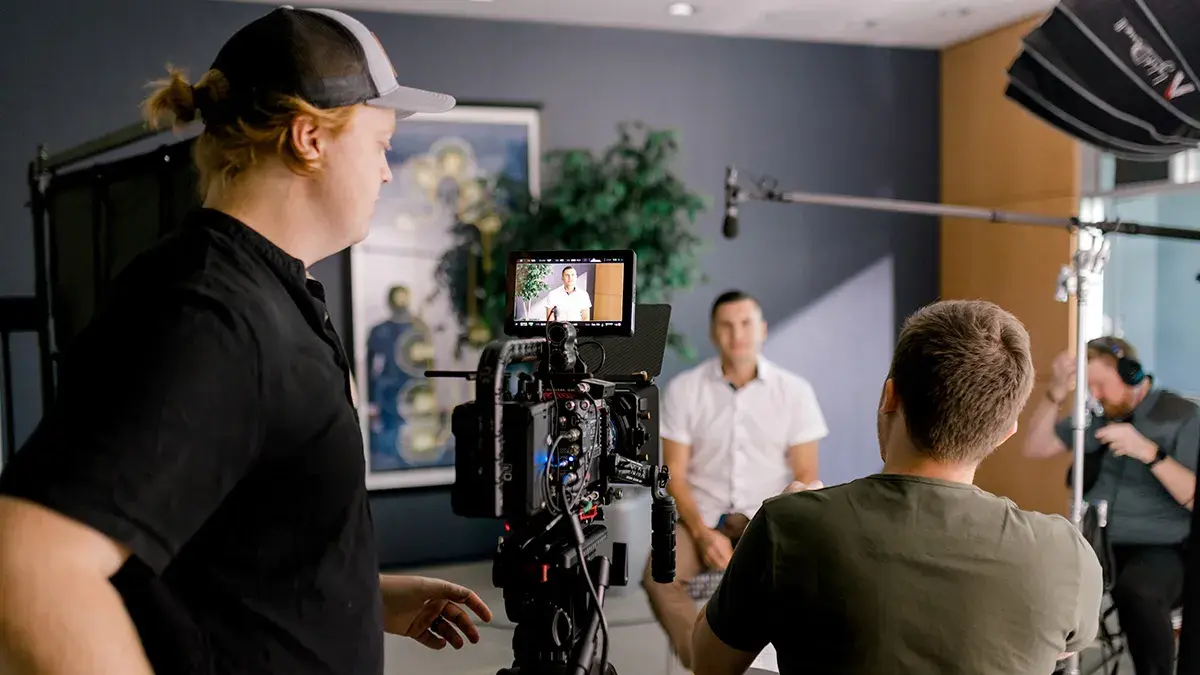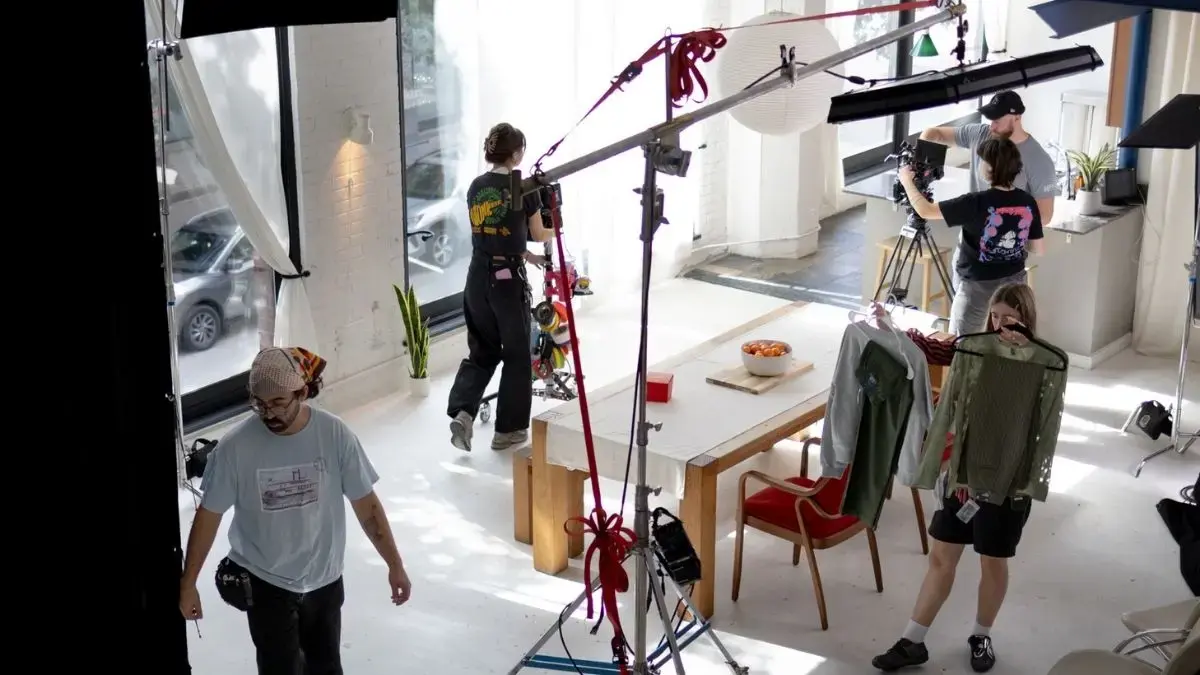B2B Video Marketing: Strategies and Best Practices for Success
Business-to-business (B2B) marketing relies heavily on long-term branding and lasting impressions. In today's digital age, video content remains one...
▶ Video Strategy & Discovery
A video marketing strategy will keep your production cohesive and on schedule.
▶ Creative Treatments, Scripts & Storyboards
Bring your vision to life with professional scriptwriting and storyboarding services.
▶ Production Preparation
Prepare for your corporate video with professional video production services.
▶ Full Service Filming Days
Discover how Charter & Co can help you bring your vision to life through expert on-set filming services.
▶ Video Editing, Color Grading & Sound Design
Elevate your video marketing with Charter & Co’s expert video editing and post-production services.
▶ Motion Graphics
Captivate audiences with videos, ads, and social media that include high-quality animations.
▶ Licensed Music & Voiceovers
Elevate your videos with high-quality music licensing and voiceover services.
▶ Distribution Strategy & Advertising Support
Get your content noticed with a comprehensive video distribution strategy.
▶ Everything Video Marketing
Video marketing resources: What it is, why it matters, and how to do it.
▶ Everything Video Production
Your ultimate guide to video production resources: Tips and tricks for creating masterful videos.
▶ Blog
Helpful Blog resources for all of your video production and marketing needs

B2B video marketing has become a necessity in today's digital environment, especially within saturated and complex industries. Video content differs from the usual advertising strategies directed at consumers and clients. High-quality visuals can grab and retain potential partners' attention on LinkedIn, on your landing page, and in search engine results when looking for solutions. Short-form videos are particularly powerful, delivering information quickly without taxing viewers' short attention spans.
That said, video campaigns must be targeted and solution-oriented, clearly laying out all the details businesses need to know. The best B2B marketing videos, such as testimonials and demos, build trust and simplify the buyer journey. They answer common questions, build your brand's authority, and target your audience's precise pain points. Plus, with voiceovers, text graphics, and quick editing, videos give you multiple ways to communicate critical information in a limited timeframe.
Beyond production, videos are especially beneficial for B2B businesses because they're easy to repost. Professionals can share your videos, such as industry insights and demos, on social media, via email, or even in person.
Most B2B video marketing strategies hinge on the 95:5 rule, which estimates that only about 5% of potential clients are actually in a position to invest in your solution right now. For example, a company realistically won't be interested in changing its internet provider until its current contract is complete. So, your best video content may benefit more from raising awareness and trust around your brand and products rather than calling for an immediate purchase.
As you establish your video marketing strategy, consider your short- and long-term business goals, including the key metrics you'll use to track performance. This requires you to genuinely understand your target audience, including their buying habits, pain points, and online behavior.
Key video marketing B2B objectives include:
Sales enablement: At a base level, videos should encourage clients to invest in your products or services or at least keep your brand name in mind when it's time to make a decision.
Brand awareness: Video content should offer new viewers a strong first impression of your brand while keeping your business on other viewers' minds.
Lead generation: Most new clients take some time traversing the sales funnel before investing in your product or service. Rather than solely targeting revenue, consider other ways to build loyalty with potential clients, such as by calling viewers to sign up for newsletters, follow your LinkedIn, or learn more from another video.
Building trust and authority: In the B2B market in particular, it's crucial that you present your business as an expert in its field. Videos about industry trends and insights raise your brand's credibility and modernity.
It's not enough to cross your fingers and hope your video content does its job. Your campaign will benefit significantly if you set measurable goals with easy-to-track metrics, such as number of leads, increased web traffic, or level of social media engagement. These outcomes will highlight your most successful strategies and help you determine if your video budget is realistic.
That said, some B2B goals are more challenging to track than others. For example, online engagement can indicate better brand awareness, but you can't actually measure how many decision-makers know about your business. B2B brand awareness and growth occur organically over time. So, you should set realistic objectives and work with B2B video production teams that understand your unique goals.
Defining your target audience can be tricky, depending on your industry, your product or service, and the specific decision-makers you're trying to reach. For example, business software is often marketed to office managers and team leaders, whom you may need multiple platforms to reach.
One of the best ways to understand your audience is by developing customer personas based on your audience's key demographics and buying decisions. For instance, you could establish different personas for business leaders in their 30s as well as those in their 60s.
LinkedIn has become an invaluable tool when marketing to B2B customers. Over a billion professionals use the social media app to expand their networks and learn more about industry developments, giving you an excellent avenue to raise brand authority and awareness.
Different types of videos can benefit your B2B video marketing goals in unique ways. It's crucial to understand each format's specific strengths and what stages of the sales cycle they suit the best. In many cases, you may be able to link related videos together using calls to action (CTAs) to make the cycle move even faster.
The top types of B2B marketing videos include:
Explainer videos: Explainers offer an in-depth look at how products work and benefit businesses, which can attract potential customers still in the early stages of the sales cycle. For example, a video showing how your software integrates new artificial intelligence (AI) technology could grab potential viewers' interests, even if they aren't currently investing in new software.
Client and customer testimonials: These videos share previous users' success stories, citing analytics and metrics to show how your solutions addressed the business's precise needs. These can influence customers in the decision-making stages of the sales cycle by boosting trust and providing an external source for reference.
Product videos: These videos provide brief overviews or demos of specific products and services, including their uses, benefits, and unique features. They should answer basic questions and help viewers visualize the functionality of your product, encouraging them to make a final purchase.
Thought leadership videos: Webinars, podcasts, and other videos about industry news and trends can raise your brand's credibility and boost trust for customers across all parts of the sales cycle.
B2B video production is an extensive process, requiring multiple steps to bring your vision to life. First and foremost, you must plan your production strategy based on your business goals and your unique target audience.
From here, develop scripts, storyboards, and shot-by-shot breakdowns of everything you want to capture. Thorough documentation will help you plan everything you'll need for the actual production, including video equipment, wardrobes, props, dialogue, and an actionable timeline. Understanding your needs upfront is especially crucial for controlling costs. Budget your funds across different video stages and departments to ensure you'll have enough funds to complete your video and still potentially use paid advertisements.
After filming your video, your project will move into post-production. Professional video editors can cut your footage down to its best, most engaging moments and enhance your final video with motion graphics, music, color correction, and well-timed transitions.
As discussed, LinkedIn is by far the best social media platform for reaching business leaders, especially when demonstrating thought leadership. However, other apps such as Facebook, TikTok, and Instagram may boost your marketing channels for specific demographics and age groups. For example, if you're primarily marketing to start-ups, you may benefit from sponsored TikTok ads targeting young entrepreneurs.
Businesses can also take advantage of YouTube B2B marketing. Even if you don't specialize in videos for YouTube, uploading your explainer and product videos will give people a clean channel of content to watch. YouTube video marketing is especially crucial for search engine optimization, increasing the odds of your content appearing in search results — especially if you use keywords in your title and descriptions. This can make your online videos easier to find and share, even years later.
Consider ways to integrate video content into your other marketing strategies, too. For example, you could embed YouTube links into emails or repurpose assets using sales enablement video portals, letting potential customers choose which videos appeal to them. Videos can also make a powerful impact on your company's landing pages, immediately engaging viewers and drawing their attention to the most important details.
Whether you're marketing on social media or a search engine, be aware of your platform's format and guidelines. Paid promotions often require your video to fit specific resolutions, aspect ratios, and durations. Additionally, sharing improperly formatted videos can encourage viewers to keep scrolling and set a bad precedent for your brand. Fortunately, a B2B video agency can export your videos in the best formats for each platform after discussing your distribution goals.
Success metrics, such as marketing qualified leads (MQLs), Click-through rates (CTRs), and video views, will define your video marketing guide and best practices.
As you set your B2B video marketing goals, consider the metrics and key performance indicators (KPIs) you can use to track performance over time. Utilizing several metrics at once establishes a clear foundation for your marketing campaign and highlights your most and least successful strategies.
The best KPIs and metrics for B2B marketing videos include:
Average video watch duration
Social media engagement, such as likes, shares, and follows
Search engine and social media analytics
CTRs
Web traffic and link clicks
Conversion rates
Sales and sign-ups
New client survey results
B2B marketing tools such as Wistia, Vidyard, and GA4 collect and analyze key metrics for easy access. This way, you don't have to compare the analytics across every social media platform to understand how well your campaign is doing. Many tools also highlight specific areas for growth or recommend new campaign strategies, such as by suggesting which parts of the sales funnel to target next.
Other excellent practices for managing B2B video marketing success include:
A/B testing: This marketing tactic trials two distinct advertising strategies at once to directly compare their results. For example, you could post a two-minute explainer video and then share a 30-second version to see which format gains the most engagement.
CTAs: Calls to action at the end of videos or in captions can influence potential customers to move onto the next part of the sales cycle, such as by watching another video, signing up for updates, or making a purchase.
Keywords and captions: Topical keywords and phrases make your content appear more relevant to social media and search engine algorithms. Tracking content success by keyword usage can further highlight your best campaign strategies.
Deadlines, budgets, brand alignment, and other challenges can limit your creative process. A professional production company, such as Charter & Co, simplifies execution and recommends corporate video production tips so you can focus on the details that matter.
Even if you have limited resources, you can still capture B2B attention with video by taking advantage of the latest B2B trends, including:
AI personalization
Webinar videos
Social snippets
Short-form videos and reels
When it comes to B2B video marketing, strategy is everything — and execution makes it real. Charter & Co acts as a fully integrated video partner to leave lasting impressions on all potential clients, including the 95%. Talk to our team to get started.
Business-to-business video marketing is the use of video content to make your products or services stand out to other businesses and potential clients. B2B videos are particularly effective on LinkedIn, letting you ease your way into other businesses' networks before they even invest in your solution.
The four types of B2B marketing focus on producers, resellers, institutions, and governments. Your ideal B2B marketing strategy depends on the organizations and clients you're marketing to.
The B2B 95:5 rule dictates that 95% of potential customers aren't in a position to invest in your solutions just yet but will be at a later date. This rule emphasizes the need to raise brand awareness, authority, and thought leadership for long-term growth.
The B2B "Rule of Seven" theorizes that a potential client needs to hear your brand's message at least seven times before they actually decide to move forward with your business. This emphasizes the importance of establishing long-term relationships and fostering ongoing trust.

Business-to-business (B2B) marketing relies heavily on long-term branding and lasting impressions. In today's digital age, video content remains one...

The History of B2B Video Marketing B2B video marketing has been around since the early 1940s, but it hasn’t always been so glamorous. Because B2B...

With close to 10 million residents, the Chicago area has an expansive population of potential customers and clients for your business. Video content...